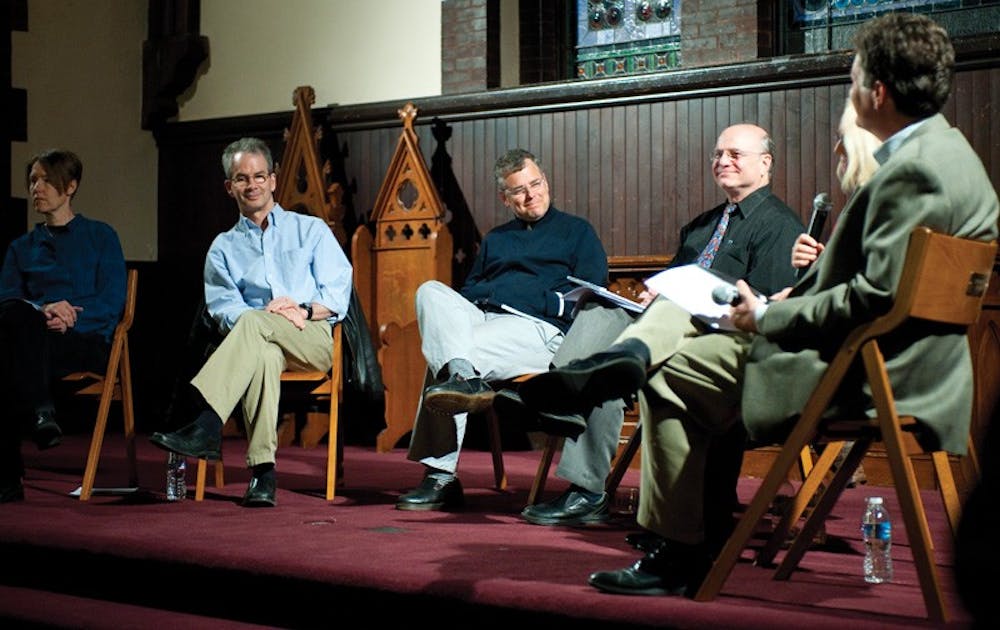The Center for International Studies and the East Asia Center held a panel yesterday on the current crisis in Japan following the destructive earthquake and tsunami. The panel featured six professors from the Education School, Architecture School and the politics and anthropology departments.
March 11, a 9.0 magnitude earthquake hit the coast of Japan, the largest to strike the country, which was then combined with the effects of a tsunami. In addition, the nation faced the worst nuclear emergency since Chernobyl as leaks and explosions occurred in three reactors at the Fukusima Daiichi Nuclear Power Station. Meanwhile, spent fuel rods at another reactor overheated and caught fire, causing radioactive material to be released directly into the atmosphere.
Politics Prof. Len Schoppa served as the moderator of the panel and focused on the way the Japanese political system is dealing with the disaster and nuclear power.
"Like virtually every other society, Japan's political system is not perfect and disasters like these reveal its problems," Schoppa said. He said this crisis highlights mistakes the Japanese government had made in deciding to allow a nuclear power plant to be built in such a dangerous and vulnerable area and in allowing such an extensive nuclear system to exist in a dangerous way.
Schoppa listed various groups which can be blamed for the poor monitoring and establishment of nuclear plants, including the bureaucracy, politicians and Tokyo's Electric Power Company. He acknowledged, however, that there is much to be learned from Japan's experience, and he hopes it will encourage people to look at business from a new perspective, without experiencing its pain.
"What I'm saying about Japanese politics can also be said about American politics," he said.
Assoc. Architecture Professors John Quale and Kirk Martini discussed the importance of the structural soundness of Japanese architecture.
Quale, a former Fulbright Scholar at the University of Tokyo with an interest in affordable, sustainable housing, said Japan has the most sophisticated prefabricated housing in the world. Although there isn't much emphasis on affordable housing currently, the Japanese now "may actually be in a unique position to take sophisticated models and apply them to affordable housing," Quale said. He said he believes there will be an effort to make this happen in the near future.
Martini, who has an undergraduate degree in Structural Engineering from the University of California at Berkeley, discussed how much worse the disaster could have been. Given the earthquake's size and density, he said, there was relatively little damage. If this same disaster had occurred in San Francisco or Los Angeles, the damage would have been much worse because of the numerous number of old buildings.
Assoc. Education Prof. Diane Hoffman spoke of cultural issues which have played an enormous role in the traumatic experience of the Japanese, focusing on the theme of human relationships and spirituality.
Education Prof. Peter Sheras also concentrated on the experience of the Japanese people after the earthquake and tsunami and the effects they still are dealing with. He has experience with post-disaster mental health and psychological first aid through working with organizations such as the Red Cross. He explained the ways in which people in Japan may demonstrate symptoms of post-traumatic stress, either by externalizing or internalizing it. Examples of these include ongoing fear and inability to concentrate. Sheras also sympathized with the Japanese leaders, saying "the leaders and people in charge have been criticized for slow response, but we forget that these people are experiencing trauma as well."
Kath Weston, anthropology professor and director of the Studies in Women and Gender program, was in Tokyo during the time of the earthquake, planning to attend an Asia Global Studies conference.
"Even in the middle of this earthquake, I thought to myself, if you were to be in any other place to experience an earthquake I would rather be in Japan," she said, referencing the level of infrastructure in place. Weston brought together the various viewpoints of the other panelists by combining cultural, architectural, economic and psychological aspects. "You had a thought that these may be the people you die with, and then you go your separate ways."
After listening to the panel, fourth-year College student Nancy Laura Tappan said she felt University students "could help out in one of two ways, by donating or by holding educational symposiums." Third-year College student Yonathan Anatolii Ast said the panel itself was reassuring. "It's comforting, after listening to all the panelists, to have the sense that [the Japanese people] will be OK and will bounce back," he said.







